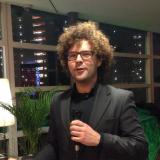Dangerous Fantasies: Deepfakes in the Porn Industry
Around 95% of all deepfakes are currently non-consensual porn videos. What important ethical considerations should we take into account when drafting legislation around AI generated pornographic content? Let’s discuss it during this interdisciplinary panel discussion. (English / SG-Certificate*)
Time: 16:45-18:30 hrs.
Admission is free, no registration required.
What is a deepfake
Deepfakes are sounds, images, videos, or even complete online personas that are fake, but appear highly realistic. They are usually created by artificial intelligence. It is incredibly hard to spot high quality deepfakes from real digital materials and as the technology develops even further, this will only get harder. On the other hand, the technology to create a deepfake is not that difficult to use and is often readily available.
Deepfake pornography
This already creates big consequences for our society, as it is estimated that around 95% of all deepfakes are non-consensual porn videos ('Deepfakes: The legal challenges of a synthetic society'). Many of these deepfakes involve people partaking in certain sexual activities (mostly women and celebrities), while they never actually performed these acts. What kind of ethical questions should be raised when discussing AI generated porn videos? What are the current regulatory and judicial challenges we have to deal with? In what ways do these deepfakes influence the pornography industry, our social and private lives and human sexual behavior?
The danger of deepfakes from different perspectives
During this panel discussion, our four experts from the fields of law, AI and philosophy, will elaborately address these issues from multiple disciplines. The event will be moderated by Cognitive Science and Artificial Intelligence student Alexandra Hooser.
Speakers
-

Roos Slegers
Assistant professor, Philosophy department (Tilburg University)Roos Slegers is assistant professor at the Philosophy department of Tilburg University, where she teaches courses on philosophy, literature and economics, such as ‘Philosophy of Media and Online Culture’ and ‘Human Futures in the Digital Age’. Her research interests involve neoliberalism, free markets, bureaucracy and organizations, but also phenomenological approaches to uncanny robots and modern tech in literature and pop culture. Her teaching style is best described as interdisciplinary, applying rigorous philosophical thinking to (contemporary) issues in business, economics, politics, science and pop culture.
-

Lisa Rombout
Teacher, department of Cognitive Science and Artificial Intelligence (Tilburg University)Lisa E. Rombout is a PhD candidate and lecturer at the department of Cognitive Science and Artificial Intelligence at Tilburg University. Her main research interests are embodiment and multi-sensory integration. Lisa’s ‘Hacking Intimacy’ project explores how humans are intimate with and through technology, and how this may develop in the future. Her projects won prizes at Goldsmiths Universities’ SexTechHack two years in a row, and she continues to advocate for open-minded and inclusive research into human-technology intimacy. During this discussion, she will focus on her expertise in embodiment and VR, talking about human-technology intimacy, VR pornography, teledildonics, and sexrobots.
-

Bart van der Sloot
Associate professor at the Tilburg Institute for Law, Technology, and Society (Tilburg University)Bart van der Sloot is an associate professor at the Tilburg Institute for Law, Technology, and Society, Tilburg University. He is specialized in questions revolving around law and technology, privacy and Big Data. Bart has a dual background in philosophy and law and is General Editor of the European Data Protection Law Review. He has won three prestigious prices and grants: the NWO Top Talent Grant, the NWO Veni Grant and the KNAW Early Career Award. Last year, he co-authored the report ‘Deepfakes: The legal challenges of a synthetic society'.
-

Marco Bassini
Assistant Professor of Fundamental Rights and Artificial Intelligence (Tilburg University)Marco Bassini is Assistant Professor of Fundamental Rights and Artificial Intelligence at the Tilburg Institute for Law, Technology, and Society, Tilburg University. His research interests include, among others: protection of human rights in the digital age, populism and constitutional law, European constitutional law. He has been awarded with the “Vittorio Frosini” Prize for the best doctoral thesis in the field of information technology law defended in 2015-16.
More information
This program is organized by Studium Generale in cooperation with Study Associations Enigma (CS&AI) and ELSA (Law).
Contact: Hannah van den Bosch (Studium Generale).
* For students, this lecture may count towards the SG-Certificate. Check the SG-Certificate website for all the terms and conditions.
